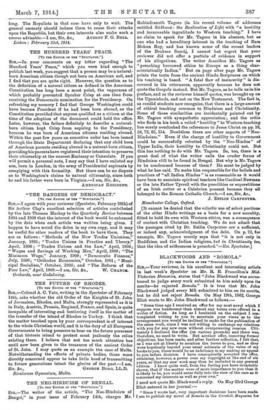THE NEO-HINDUISM OF BENGAL. [To rag Emma or Tea "Srrersroa."]
Srn,—The writer of the article, "The Neo-Hinduism of -Bengal," in your issue of February 14th, charges Mr. Rabindranath Tagore (in his recent volume of addresses entitled Scidhand : the Realisation of Life) with "a hostility and inexcusable ingratitude to Western teaching." I have no claim to speak for Mr. Tagore in his absence, but as one who had a hereditary interest in the teaching of Ram Mohun Roy, and has known some of the recent leaders of the Brahmo San*, I cannot bet regret that your reviewer did not offer a particle of evidence in support of his allegations. The writer describes Mr. Tagore as "preaching borrowed ethics to Europe as a thing char- acteristically Indian." But on page after page Mr. Tagore prints the texts from the ancient Hindu Scriptures on which his teaching is based. "A fatal flaw of insincerity" is dis- covered in his utterances, apparently because he does not quote the Gospels instead. But Mr. Tagore, as he tells us in his preface, and as the reviewer himself quotes, was brought up on the Upanishads, and not on the New Testament. The fact is„ as candid students now recognize, that there is a large amount of ethical teaching common to Hinduism and Christianity. Some of these similarities are incidentally pointed out by Mr. Tagore with sympathetic appreciation; and the critic who finds in his book a veiled "hostility " to Western teaching has surely overlooked the references to Jesus Christ on pp. 16, 58, 72, 85,154. Doubtless there are other aspects of " Neo- Hinduism." Even if the charge of hostility to Government could be successfully rebutted by the " Neo-Hindus " of Upper India, their hostility to Christianity could not. But this has nothing to do with Mr. Tagore. So, too, there is a great deal of what the writer calla the cruder forms of Hinduism still to be found in Bengal But why is Mr. Tagore to be condemned because of them P He must be judged by what he has said. To make him responsible for the beliefs and practices of "all Indian Hindus " is as reasonable as it would have been to associate spiritual teachers like Cardinal Newman or the late Father Tyrrell with the puerilities or superstitious of an Irish cotter or a Calabrian peasant because they all belonged to the Roman Catholic Church.—I am, Sir, &a., [It cannot be denied that the eclectic use of select portions of the older Hindu writings as a basis for a new morality, fitted to hold its own with Western ethics, was a consequence of contact with Christian teaching. We do not admit that the passages cited by Dr. Estlin Carpenter are a sufficient, or indeed any, acknowledgment of the debt. On p. 72, for example, Mr. Tagore merely says that "it is not only in Buddhism and the Indian religions, but in Christianity ten, that the idea of selflessness is preached."—En. Spectator.]














































 Previous page
Previous page